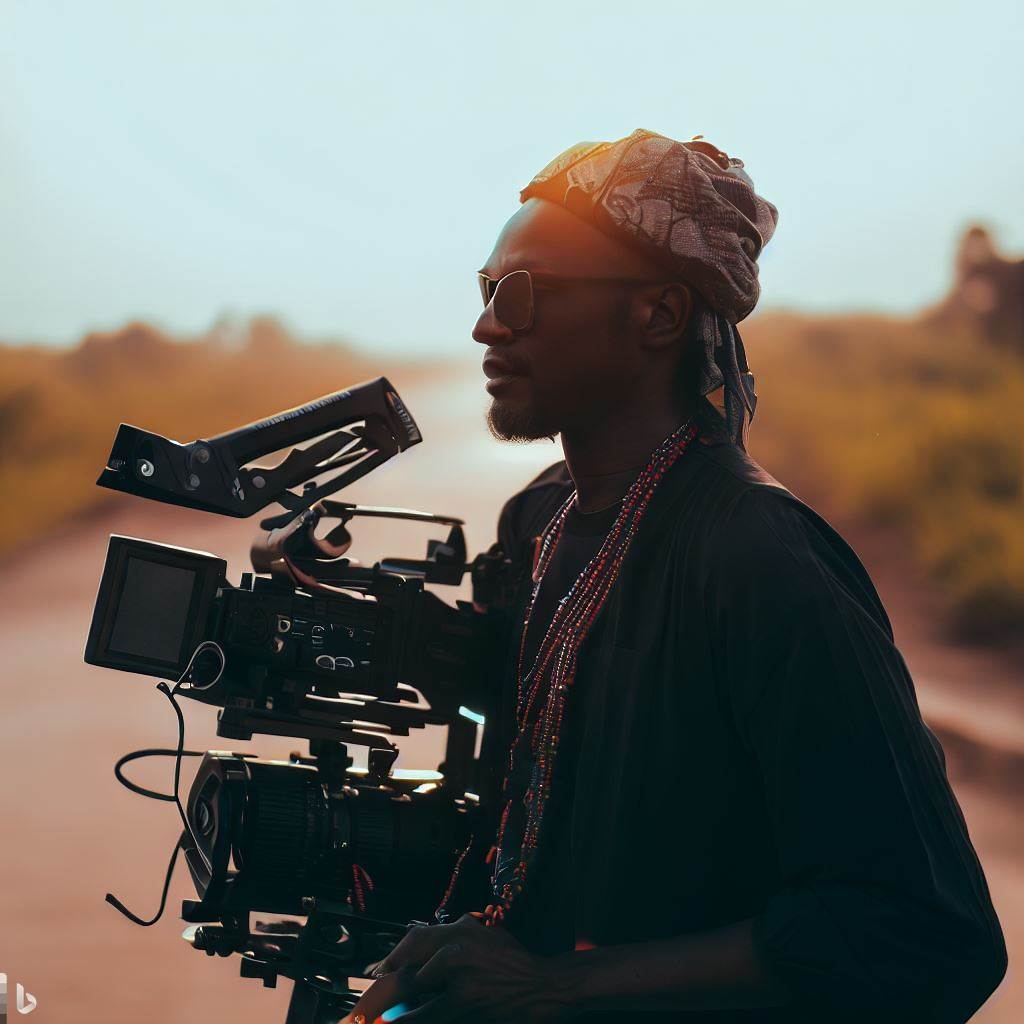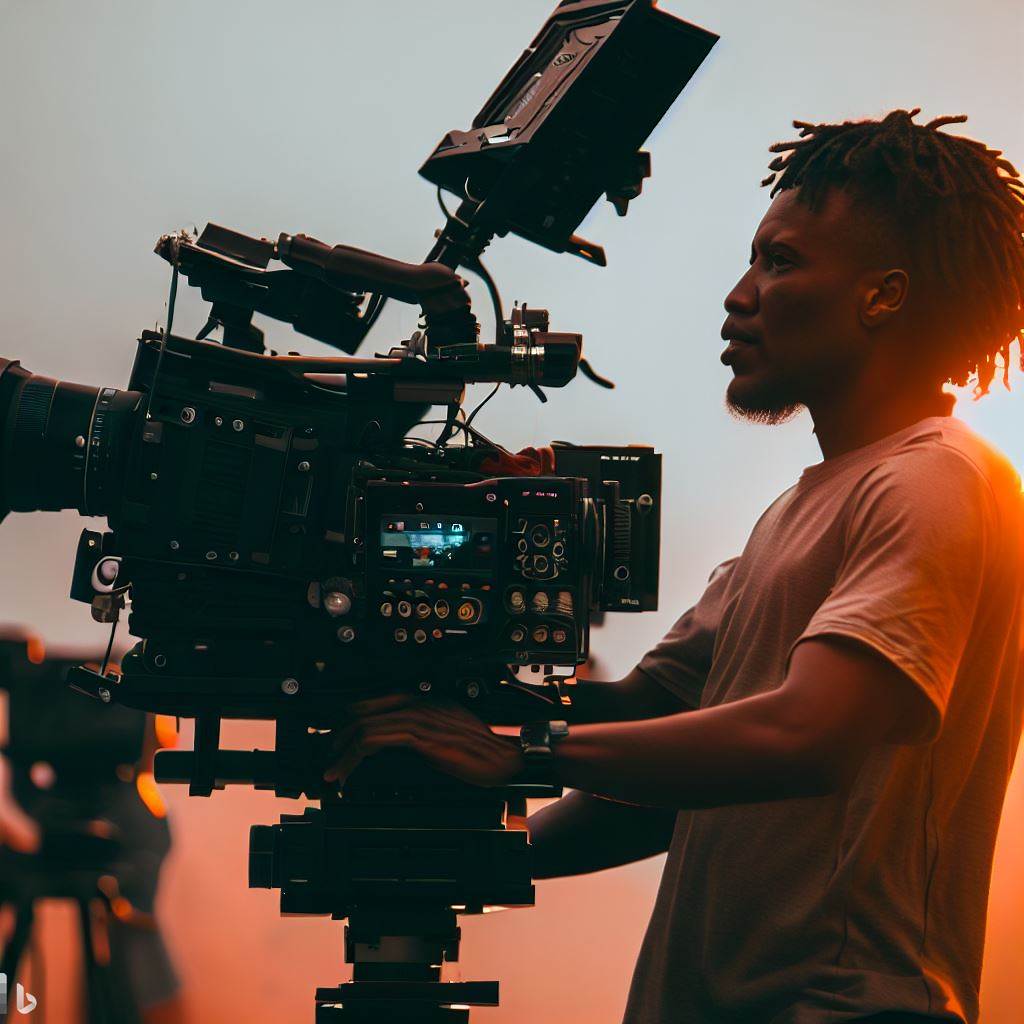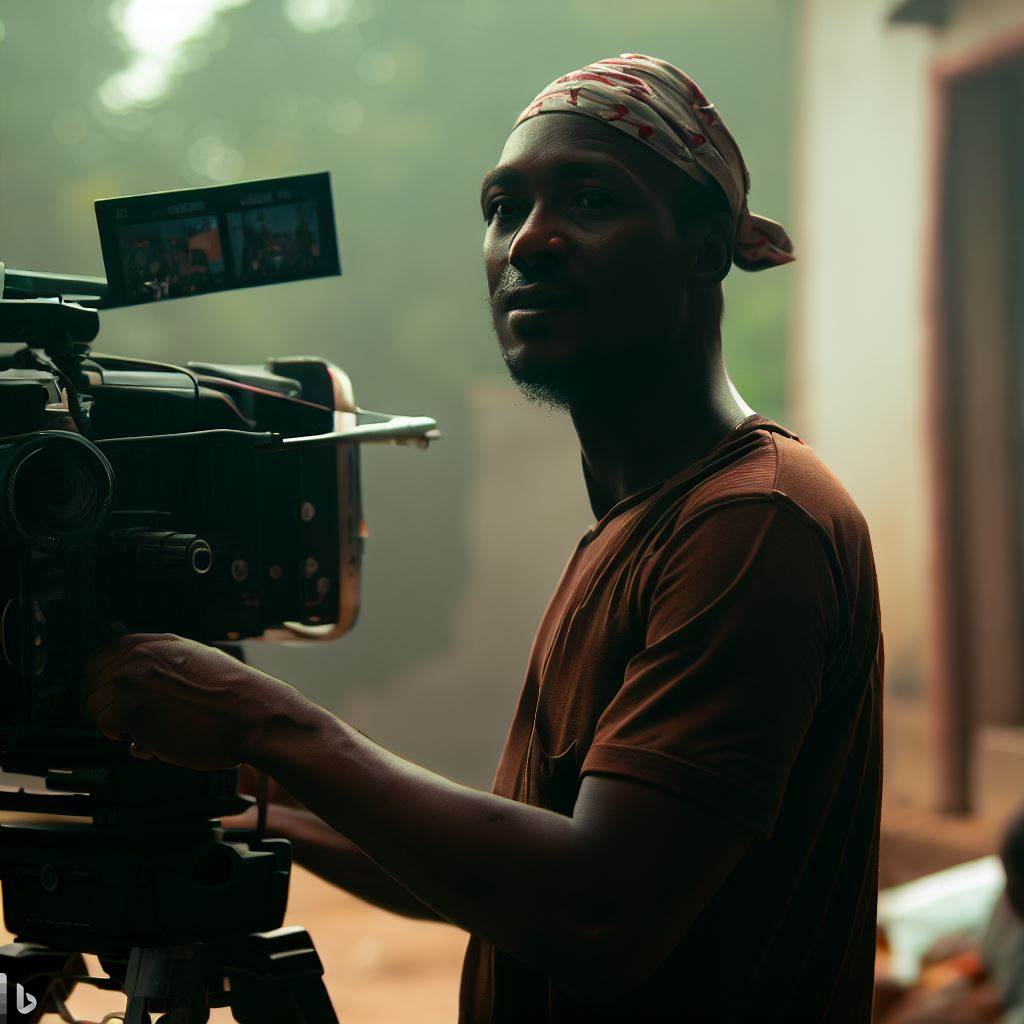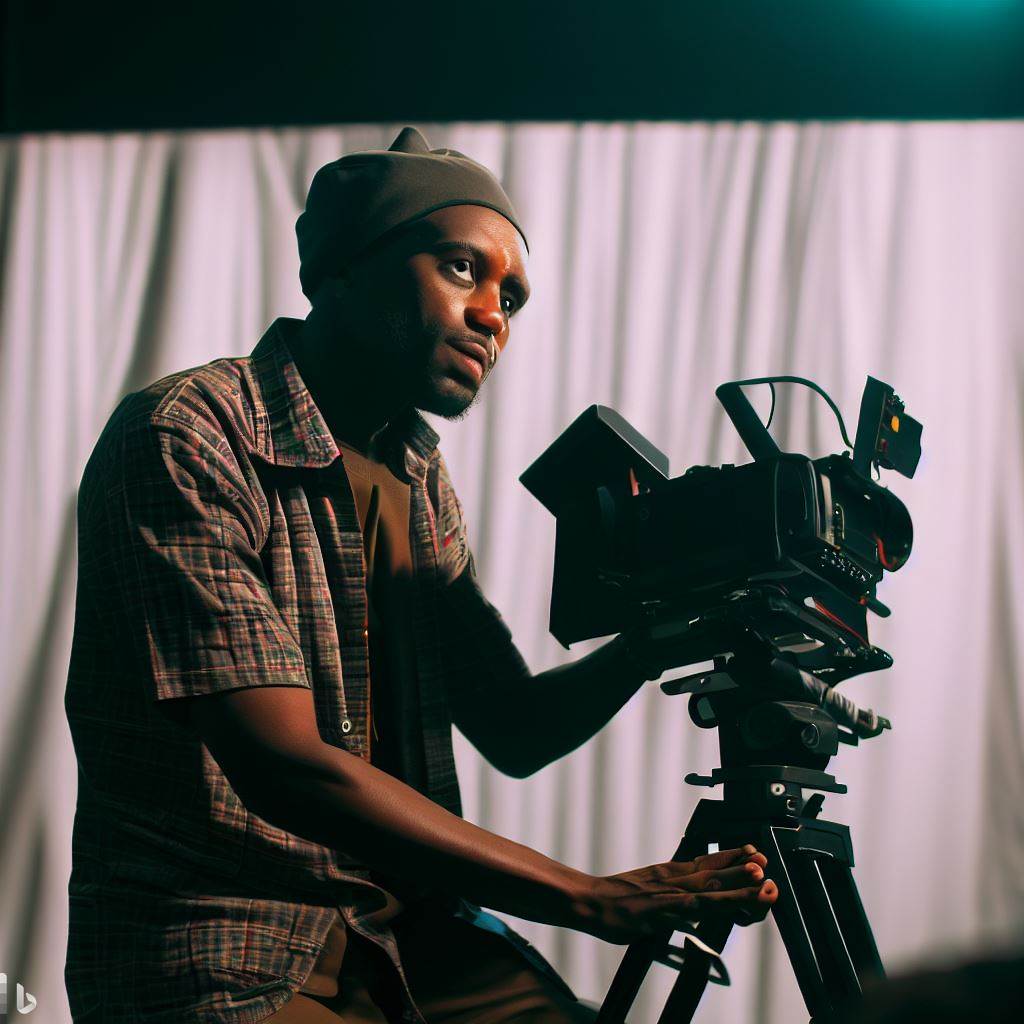Introduction
In Nigeria, becoming a cinematographer is a journey filled with challenges and opportunities.
Cinematography plays a vital role in the flourishing film industry, capturing the essence and emotions of storytelling through visual art.
- The journey to becoming a cinematographer in Nigeria is an exciting and rewarding pursuit.
- Cinematography is the visual soul of filmmaking, shaping storytelling and emotions.
- It plays a pivotal role in bringing cinematic visions to life.
Significance of cinematography in the film industry:
- Visual Storytelling: Cinematographers translate scripts into captivating visual narratives.
- Mood and Atmosphere: They use lighting, framing, and composition to convey emotions and atmosphere.
- Aesthetic Excellence: Cinematography enhances a film’s aesthetic quality, elevating its impact.
- Collaboration: Cinematographers work closely with directors, enhancing the director’s vision.
- Audience Engagement: Captivating cinematography immerses the audience, making films more memorable.
- Industry Recognition: Cinematographers are key contributors to a film’s success, often receiving awards and accolades.
In addition, the path to becoming a cinematographer in Nigeria is a journey of creative expression and storytelling.
Cinematography’s significance in the film industry cannot be overstated; it is the art that breathes life into cinematic experiences.
Aspiring cinematographers should embrace the art, craft, and technology of their field to excel in this dynamic and influential profession.
Background and Challenges
current state of the Nigerian film industry
- The current state of the Nigerian film industry is one of growth and potential.
- Nollywood, as it is commonly known, is the second-largest film industry in the world.
- However, despite its prominence, the industry still faces numerous challenges.
Challenges faced by aspiring cinematographers in Nigeria
- Limited access to proper equipment is a major obstacle for aspiring cinematographers.
- Good cameras, lighting equipment, and editing tools are often expensive and difficult to obtain.
- This lack of equipment hinders the growth and development of cinematography skills.
- Inadequate training opportunities also present challenges for aspiring cinematographers.
- There is a scarcity of institutions and programs that offer comprehensive training in cinematography.
- Many aspiring cinematographers have to rely on self-teaching or learn from experienced professionals.
- Another significant challenge is the lack of opportunities for young cinematographers to showcase their skills.
- Established filmmakers and production companies often prefer experienced cinematographers.
- This preference means that aspiring cinematographers struggle to find work and gain experience.
The lack of proper equipment, training, and opportunities:
1. The lack of equipment not only limits the quality of work but also hampers creativity.
2. Without access to advanced cameras and lighting equipment, cinematographers are unable to achieve their desired visual effects.
3. Limited training opportunities leave aspiring cinematographers with gaps in their knowledge and skills.
4. Proper training is essential for mastering the technical aspects of cinematography.
5. Moreover, lack of opportunities hinders the growth and exposure of young and talented cinematographers.
6. Without work experience or a portfolio, it becomes challenging for them to establish their careers.
While the Nigerian film industry possesses immense potential, aspiring cinematographers face several challenges.
The lack of proper equipment, training opportunities, and difficulties in finding work hinder their career growth.
Established filmmakers, government support, and training initiatives can collaboratively overcome challenges, fostering growth for aspiring cinematographers in Nigeria.
Passion for Cinematography
Personal experiences or story of an aspiring Nigerian cinematographer
My journey to becoming a cinematographer in Nigeria has been filled with passion and dedication.
From a young age, I was drawn to the world of visual storytelling, and this passion has only grown stronger over the years.
One personal experience that stands out is when I saved up all my money to buy my first camera. It was a simple DSLR, but it opened up a whole new world for me.
I spent hours experimenting with different shots and learning about composition.
What drives me the most is the love for visual storytelling. I believe that a well-crafted shot has the power to evoke emotions and captivate audiences.
Whether it’s a simple scene or an elaborate set, every frame can contribute to the overall impact of a film.
The passion and love for visual storytelling
Cinematography plays a crucial role in Nigerian movies. It adds depth and dimension to the storytelling process, making the audience feel like they are a part of the narrative.
With the right use of lighting, camera angles, and movement, a cinematographer can bring a script to life.
Nigerian movies have a unique culture and identity, and cinematography helps showcase this diversity.
From the vibrant colors and rich landscapes to the lively characters and expressive performances, every aspect of Nigerian culture can be portrayed through the lens of a cinematographer.
The impact of cinematography on Nigerian movies and culture
The impact of cinematography on Nigerian movies cannot be underestimated. It has elevated the quality of storytelling and production value.
With the advancements in technology, cinematographers now have access to tools that were once considered a luxury.
As an aspiring Nigerian cinematographer, I am committed to honing my skills and contributing to the growth of the industry.
I attend workshops, collaborate with fellow filmmakers, and constantly seek inspiration from both local and international cinematographers.
One of my favorite cinematographers is Tunde Kelani.
His work in movies like “Saworoide” and “Dazzling Mirage” has inspired me to push boundaries and strive for excellence.
His attention to detail and ability to create visually stunning scenes is unmatched.
Transform Your Career in Nigeria
Discover unmatched expertise with our personalized Career Consulting service. Navigate Nigeria’s job market with a strategy tailored just for you.
Get StartedBeing a cinematographer in Nigeria comes with its own set of challenges. Limited resources and funding can sometimes hinder the creative process.
However, I believe that passion and determination can overcome any obstacle.
The journey to becoming a cinematographer in Nigeria is not an easy one, but it is certainly fulfilling.
The passion for visual storytelling, the impact on Nigerian movies and culture, and the constant pursuit of excellence are what drive aspiring cinematographers like me.
With dedication and perseverance, I am confident that I will make my mark in this industry.
Read:Understanding The Role of Performers’ Agents in Nigeria
Educational Journey
Aspiring cinematographers in Nigeria have several academic options to choose from in order to pursue their passion for film-making.
The country offers a range of film schools, courses, and programs that provide comprehensive education and practical experiences.
1. Film Schools
- Nigeria Film Institute (NFI)
- National Film and Television Institute (NFTI)
- Del-York Creative Academy
- Centurion Creative Arts Foundation
These film schools have established themselves as reputable institutions, providing quality education in cinematography.
They offer specialised courses and programs that equip students with the skills and knowledge required to excel in the industry.
2. Courses and Programs
- Bachelor’s Degree in Film and Cinematography
- Diploma in Cinematography
- Master’s Degree in Cinematography
- Certificate Programs in Cinematography
These academic programs are designed to provide aspiring cinematographers with a strong foundation in the technical and artistic aspects of cinematography.
They cover topics such as cinematographic techniques, lighting, composition, camera operation, and post-production processes.
3. Curriculum and Practical Experiences
The curriculum of these academic programs is carefully crafted to ensure a comprehensive understanding of cinematography.
Students engage in both theoretical and practical coursework, allowing them to apply their knowledge in real-world settings.
Some of the practical experiences gained during the educational journey include:
- Hands-on experience with professional film equipment
- Participation in film projects and productions
- Collaboration with fellow students and industry professionals
- Internships with established cinematographers and production companies
These practical experiences provide aspiring cinematographers with a valuable opportunity to hone their skills and build a strong portfolio.
Aspiring cinematographers can enhance their knowledge and network with industry professionals by attending workshops, seminars, and film festivals.
Nigeria provides a range of educational options for those aspiring to become cinematographers.
Aspiring cinematographers can achieve their dreams in the Nigerian film industry by attending reputable film schools, pursuing specialized courses, and gaining practical experience.
Read:In-Depth Look: The Competitive Landscape for Makeup Artists in Nigeria

Building Networks and Collaborations
In the film industry, networking plays a crucial role in the journey to becoming a successful cinematographer in Nigeria.
Building connections with filmmakers, directors, and producers is essential for career growth and opportunities.
Importance of networking in the film industry
- Networking opens doors to new opportunities and projects.
- It allows cinematographers to learn from experienced professionals and gain valuable insights.
- Building connections can lead to recommendations and referrals for future job prospects.
- Networking helps to stay updated with the latest trends and innovations in the industry.
- It creates a support system of like-minded individuals who can collaborate and share resources.
Tips on establishing connections with filmmakers, directors, and producers
- Attend film festivals, industry conferences, and workshops to meet industry professionals.
- Join professional organizations and associations related to cinematography.
- Engage with filmmakers on social media platforms, sharing your work and insights.
- Offer your services as a cinematographer to student projects, independent films, and short films.
- Reach out to professionals for informational interviews and seek mentorship opportunities.
Remember, networking is about building genuine relationships, so be respectful, humble, and approachable.
Benefits of collaborating with fellow professionals in the industry
- Collaborating allows for the exchange of ideas, techniques, and knowledge.
- Working with others enhances creativity and pushes boundaries.
- It provides an opportunity to showcase your skills and expand your portfolio.
- Collaborations increase the chances of gaining exposure and recognition in the industry.
- Building a network of collaborators can result in future collaborations and referrals.
Collaborating with fellow professionals not only enhances your skills but also strengthens your presence in the industry.
The journey to becoming a cinematographer in Nigeria is greatly influenced by networking and building collaborations.
Actively seeking connections with filmmakers, directors, and producers opens doors to opportunities, knowledge, and growth.
By collaborating with professionals in the industry, cinematographers can enhance their skills, expand their portfolios, and gain exposure.
Networking and collaborations are essential ingredients for success in the Nigerian film industry news.
Read:How to Set Up Your Makeup Artistry Business in Nigeria
Overcoming Challenges in the Field
In the field of cinematography in Nigeria, there are numerous obstacles that professionals face on their journey towards success.
However, with the right strategies and mindset, these challenges can be overcome.
Obstacles faced by cinematographers in Nigeria and how to overcome them
- Limited resources and funding can be a major hindrance for cinematographers in Nigeria. To overcome this, networking and building strong connections within the industry is crucial.
Collaborating with like-minded individuals and sharing resources can help in maximizing limited funds. - Another challenge is the lack of access to cutting-edge equipment and technology.
To overcome this, cinematographers can explore alternative options such as renting equipment or seeking partnerships with production companies that have access to advanced gear. - The inconsistency in the film industry can also pose a challenge.
To overcome this, cinematographers should constantly seek out opportunities and stay updated on industry trends.
Adapting and diversifying their skills can help them become more marketable and increase their chances of success. - The competition in the field can be fierce, making it difficult for aspiring cinematographers to stand out.
To overcome this, it is important to focus on building a unique style and developing a strong portfolio that showcases their creativity and technical skills. - The unpredictable nature of the industry can also be demotivating.
Cinematographers should stay resilient and persistent, understanding that success often comes after facing multiple rejections and setbacks.
Learning from failures and continuously improving is essential. - One of the most important aspects to overcome challenges is creativity and innovation.
Cinematographers should always seek new ways to bring their vision to life, even with limited resources.
Creative problem-solving and thinking outside the box can result in unique and captivating work.
While the journey to becoming a cinematographer in Nigeria may be challenging, it is certainly not impossible.
Cinematographers thrive in the industry by strategising, networking, fostering creativity, perpetual learning, and cultivating a strong reputation, enabling quality work.
Read:Makeup Artists’ Contributions to Nigerian Television & Film
Success Stories
Achievements and contributions
- Emeka Okoye : Emeka Okoye, a renowned Nigerian cinematographer, has left an indelible mark in the industry.
- Achievements and Contributions: Okoye’s work on the critically acclaimed film “The Vision” earned him international recognition.
- Inspiration for Aspiring Cinematographers: Okoye’s journey from humble beginnings to success serves as an inspiration for aspiring cinematographers.
- Achievements and Contributions: Okoye’s work on the critically acclaimed film “The Vision” earned him international recognition.
- Femi Osagie : Femi Osagie is another Nigerian cinematographer who has made significant contributions to the industry.
- Notable Achievements: Osagie’s cinematography in the blockbuster movie “Beyond the Lens” garnered him multiple awards.
- Motivation for Aspiring Cinematographers: Osagie’s success story shows that dedication and passion can lead to success.
- Notable Achievements: Osagie’s cinematography in the blockbuster movie “Beyond the Lens” garnered him multiple awards.
- Amaka Igwe : Amaka Igwe, a pioneer in Nigerian cinema, has paved the way for future cinematographers.
- Contributions: Igwe’s films, such as “Rattlesnake” and “Violated,” challenged societal norms and propelled Nigerian cinema forward.
- Inspiring the Next Generation: Igwe’s legacy serves as a reminder that Nigerian cinematographers can make a lasting impact.
- Contributions: Igwe’s films, such as “Rattlesnake” and “Violated,” challenged societal norms and propelled Nigerian cinema forward.
- Abdul-Rasheed Bello : Abdul-Rasheed Bello, also known as JJC Skillz, successfully transitioned from music to cinematography.
- Achievements: Bello’s directorial debut, “A Trip to Jamaica,” became the highest-grossing Nigerian film of all time.
- Encouragement for Aspiring Cinematographers: Bello’s career switch demonstrates that passion and versatility can open new doors.
- Achievements: Bello’s directorial debut, “A Trip to Jamaica,” became the highest-grossing Nigerian film of all time.
These Nigerian cinematographers exemplify the success that can be achieved in the industry.
Examples of those who successfully navigated the journey
Emeka Okoye’s journey is a testament to the power of perseverance. Despite facing numerous obstacles, Okoye’s dedication to his craft propelled him to success.
His exceptional work on “The Vision” showcased his ability to capture the essence of a story through visuals, earning him prestigious accolades.
Femi Osagie’s success story demonstrates the importance of honing one’s skills. Through continuous learning and experimentation, Osagie mastered the art of cinematography.
His contribution to “Beyond the Lens” showcased his ability to create visually stunning compositions that enhanced the film’s narrative.
Amaka Igwe’s pioneering work challenged societal norms and pushed boundaries in Nigerian cinema. Her films not only entertained but also sparked conversations about social issues.
Igwe’s fearlessness and determination have paved the way for future generations of cinematographers to tell stories that resonate with audiences on a deeper level.
Publish Your Professional Profile, Business or Brand
Showcase your expertise, gain trust, and boost visibility instantly on Professions.ng.
Publish NowConclusion
The journey to becoming a cinematographer in Nigeria is not without its challenges.
From limited educational opportunities to the difficulties of networking, aspiring cinematographers must overcome numerous obstacles.
However, despite these challenges, there are success stories of talented individuals who have pursued their dreams and found success in the industry.
To all aspiring cinematographers, I encourage you to pursue your dreams regardless of the obstacles.
Seek out educational opportunities, whether formal or informal, and continue to learn and improve your skills.
Network with fellow filmmakers and industry professionals, as their guidance and support can greatly enhance your career prospects.
Despite the challenges, the future of cinematography in Nigeria is promising.
With the rapid growth of the Nigerian film industry, there is a demand for skilled cinematographers who can bring unique perspectives to storytelling.
As technology continues to advance, there will be even more opportunities for cinematographers to showcase their talents.
So, keep striving, keep learning, and keep dreaming. The journey may be tough, but the rewards are worth it.
With passion, perseverance, and a commitment to honing your craft, you can become a successful cinematographer in Nigeria.
Embrace the challenges, seize every opportunity, and believe in yourself. The future is bright for Nigerian cinematography, and you can be a part of it.




